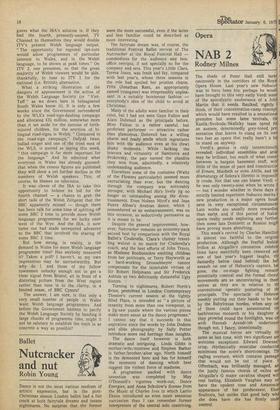Opera
NAB 2
Rodney Milnes
The shade of Peter Hall still lurks ominously in the corridors of the Roy Opera House. Last year's new Nabucc was to have been his; perhaps he woul have brought to this very early Verdi som of the apocalyptic exuberance of a Joh Martin that it needs. Baulked, rightly think, of their concentration-camp concep which would have resulted in a sensations premiere but some lame 'revivals, th Kaslik/Svoboda/Skalicky team opted fo an austere, determinedly grey-toned pre sentation that leaves to stand on its ow two feet an opera that really hasn't a le to stand on anyway.
Verdi's genius is only intermittentl revealed: individual ensembles and an may be brilliant, but much of what come between is bargain basement stuff, wi little of the sense of pace and constructio of Ernani, Macbeth or even Attila, and th dramaturgy of Solera's libretto is impossi ly crude. Not that one can blame Verdi he was only twenty-nine when he wrote — but I wonder whether in these days 0 strictly limited repertoire Nabucco merits new production in a major opera hous save in very exceptional circumstance Late works are usually more rewardin than early., and, if this period of Italia opera really needs exploring any further then some late Donizetti or Rossini migh have proved more absorbing.
This week's revival by Charles Hamilto is almost too faithful to the origin production. Although the fearful lesbia frolics at Abigaille's coronation celebra tions have mercifully been censored an one of last year's biggest laughs, th dastardly below (and behind) the be assault on one of Nabucco's captors, h gone, the on-stage fighting remain potentially comical and the formal chorU movements are as unconvincing in thenl selves as they are in relation to th conventional operatic posturing of th principals. The spectacle of Hebre meekly putting out their hands to be ti by the Babylonian hordes, when any o of them could have assassinated th herbivorous monarch or his daughter they prowled round the footlights, was on with Hannah Arendt-ish undertone though not, I fancy, intentionally.
The musical forces are virtually th same as last time, with two significant an welcome exceptions. Edward Downes' crisp, rhythmically muscular conductin minimises the score's shortcomings. Th ragbag overture, which contains passag that would not be out of place Offenbach, was brilliantly managed, an the justly famous chorus of exiles an Abigaille's G major cavatina shaped wi real feeling. Elizabeth Vaughan may no have the opulent tone and Amazoni appearance of her predecessor, Elen Souliotis, but unlike that good lady whS she does have she has firmly und control.

































 Previous page
Previous page